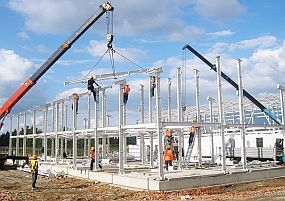Construction, Latvia, Legislation, Real Estate, Security
International Internet Magazine. Baltic States news & analytics
Friday, 19.04.2024, 17:55
Latvian EcoMin should take responsibility for liquidation of Construction Inspectorate
 Print version
Print version |
|---|
This is one of the conclusions that will be included in the commission's final report at the end of the summer or the beginning of fall.
The decision to liquidate the Construction Inspectorate was caused by the budget consolidation measures. After the inspectorate was liquidated, supervision of the construction industry was significantly impaired. The risk of the tragedy in Zolitude would have been much lower had the inspectorate not been liquidated, notes the investigative commission.
After meetings with various officials and experts, the commission has concluded that the need for reorganization of the Construction Inspectorate was already indicated in the Economy Ministry's 2008 guidelines for the development of the construction industry, where the reorganization was suggested due to the inspectorate's functions overlapping with the functions of municipal construction boards. Originally the ministry was proposing to bolster the Construction Inspectorate by the inclusion of construction inspectors from local governments' construction boards in the inspectorate. However, the proposal was turned down as it was strongly opposed by the Association of Local and Regional Governments.
As the economic situation declined quickly in Latvia and the international aid program commenced at the end of 2008, measures to reduce budget deficit had to be taken promptly. Many of the decisions taken at the time were poorly thought out and too hasty, as were the amendments to the Construction Law that liquidated the Construction Inspectorate. The official reasons for the liquidation of the inspectorate were overlapping functions and austerity.
In the investigative commission's opinion, the main goal of liquidation of the Construction Inspectorate was to save budget funds, whereas the overlapping functions was rather a pretext that was of no decisive importance.
After the Construction Inspectorate was liquidated, its functions were delegated to local governments' construction boards. However, their supervisory efficiency was insufficient, as the number of violations ascertained by municipal construction boards was significantly lower than that found by the Construction Inspectorate. The number of conflicts of interest also increased notably, as some construction projects were commissioned by local governments – which were the employers for local construction inspectors.
The local construction boards were not supervised by any authority after the liquidation of the Construction Inspectorate.
The amendments to the Construction Law were drawn up by the Economy Ministry and submitted to Saeima by the Cabinet of Ministers. During Saeima vote on June 12, 2009 all coalition and opposition members voted for the amendments.
As reported, 54 people died and scores were injured when the roof of the Maxima supermarket in Riga's Zolitude neighborhood caved in on November 21, 2013.








 «The Baltic Course» Is Sold and Stays in Business!
«The Baltic Course» Is Sold and Stays in Business!

